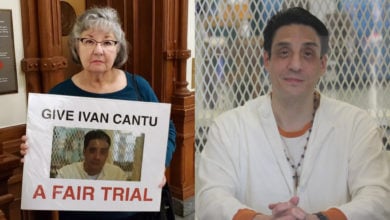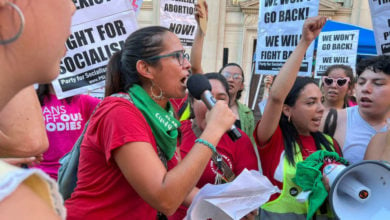On July 21, Austin City Council passed the Guarding the Right to Abortion Care for Everyone Act, which seeks to provide abortion protections within the city limits of Austin. While some local media has characterized the GRACE Act as “effectively decriminaliz[ing]” abortion, Houston Chronicle affiliate Chron characterizes the protections more pessimistically, even quoting a political science professor who describes the act as “performative politics.”
What is the actual significance of the GRACE Act, and does it “decriminalize” abortion for Austin residents? What does it do and not do? What potential does this provide abortion rights advocates in the state of Texas?
What is the GRACE Act?
The GRACE Act is a stopgap measure being considered in many cities across Texas.
It is based on Austin’s successful decriminalization of marijuana, which has not been successfully challenged by the state of Texas in the two years since it passed.
Similar bills borrowing language from the GRACE Act have passed in cities across the country, including Denton, Texas; New Orleans; Memphis; Nashville; Atlanta; Pittsburgh; Spokane, Washington; and Boise, Idaho. Many other cities, including San Antonio and Waco, Texas, are considering the measure.
Several of the provisions as passed in Austin are policy recommendations, not policies by themselves. Under Texas law and the Austin city charter, the city council cannot dictate to city employees how to handle criminal cases. The council thus makes policy recommendations, which city employees — chiefly Austin Police Department under the direction of City Manager Spencer Cronk — can choose to follow.
A draft resolution by Councilmember Chito Vela and an FAQ document by Vela indicate two initial resolutions. However, the City of Austin passed four related resolutions in one sitting:
The first resolution blocks discrimination based on individual reproductive health choices for housing or employment opportunities.
The second resolution prohibits the city from using public funds to compile or report information about miscarriages or other reproductive healthcare acts to other government agencies, and recommends that city officials, i.e., police, de-prioritize enforcement of abortion laws.
The third resolution creates a framework for educating Austinites on long-term birth control, ensuring that health care for city employees covers “low-cost birth control, including vasectomies.”
The fourth resolution directs the Austin City Manager to approve benefits for City of Austin employees that would cover travel to other states to access abortion and other reproductive healthcare services.
The second resolution, dealing with prohibition of public funding and direction of police prioritization, is the heart of the GRACE Act as initially conceived.
What does the GRACE Act cover?
The GRACE Act provides some protection against Texas’ anti-abortion trigger law, which effectively bans abortion from the moment of conception except in some limited circumstances.
By prohibiting the use of public funds for certain investigations and data storage, and recommending that city officials de-prioritize investigation of abortions, the city council limits the tools available for the state of Texas to prosecute people who have abortions. This does not change the state law, but makes it more difficult for Texas to enforce the laws if the evidence of an abortion would have been stored in Austin.
“Obviously [officers] can’t destroy or remove evidence from the record once it’s in there, but we’re trying to prevent … cataloging of that information in a way that is easily accessible after the fact,” said Jenna Hanes, Communications Director for Vela.
Key to the non-enforcement of abortion prosecutions will be progressive Travis County District Attorney José Garza. “For the moment, the state of Texas doesn’t have enforcement mechanisms if the DA declines to prosecute,” explained Hanes.
In Texas, abortion is an illegal act punishable by criminal penalties and civil fines. The GRACE Act does not change the criminalization of abortion in the state, nor does it protect anyone involved in the process from the civil fines under the SB 8 “bounty” bill. SB 8, a form of class warfare against pregnant people, bans abortions after six weeks — when most people still don’t know they are pregnant — and deputizes citizens to sue anyone who performs or aids in an abortion for up to $10,000.
Since abortion providers are still under major threat in Texas, abortion seekers may still have to go far out of state to receive services. The City of Austin is now directing the city manager to provide out-of-state travel for city employees, but the vast majority of Austin residents will still have difficulty finding abortion providers.
The act may also have greater power in numbers. A network of cities banding together to prohibit the enforcement of hateful state laws sends a powerful message, and that network is in fact being built.
As Hanes noted, “Our office has been working with a large number of these cities and activists in a bunch of different places, and we’re working with whoever wants to reach out … A lot of cities are excited about the idea that they don’t have to be complicit in their state’s violation of human rights and privacy.”
Because this act is tailored to Texas, Hanes recommended that activists working on versions of the GRACE Act not stop with the language as written, but closely examine local and state laws to expand the protections offered.
A socialist orientation to the GRACE Act
In Texas, tens of thousands poured into the streets in anger for a solid month after the Supreme Court struck down Roe v Wade. The will to fight is present, but the avenue for this fight is not always clear.
The GRACE Act provides a short-term rallying cry for organizers to push for temporary protections while building the foundations for a long-term, working-class feminist mass movement.
Even in Waco, not known as a hotbed for progressive organizing, Councilmember Kelly Palmer is calling for city leaders to pass the GRACE Act. Given that as many as 78% of Texas voters support abortion, this commonsense reform would be widely popular and should be fought for in every Texas city.
These basic reforms will face attacks from local and state levels, but this is all the more reason to engage ourselves in these local struggles. A case study of Austin political dynamics may be instructive on what these challenges will be and how to fight back.
Some challenges to Austin’s GRACE Act may come locally due to the non-binding nature of this act. The act remains a policy recommendation. Austin City Council does not have direct control over how city policy is enacted, which is instead handled by City Manager Cronk. There is no indication yet that Cronk or Austin Police Department will snub City Council’s recommendations, but both have bucked City of Austin authority when it suited them in the past. This is an unlikely, but possible scenario.
There is also the almost certain likelihood that the state of Texas will challenge measures in the act from above. Governor Greg Abbott displays open hostility to Austin whenever the city passes any sort of progressive reform. Texas may seek to make an example out of Austin by tailoring specific legislation or executive orders to stop the GRACE Act from being effective.
Local right-wing capitalists may also carry out a coordinated attack, funneling millions of dollars into what appears to be a “grassroots” campaign.
In the past, these forces have worked in conjunction to undermine progressive city-level legislation. In 2019, Austin attempted to ease the burden on homeless people by partially decriminalizing homelessness. This provoked immediate responses and backlash from reactionary groups. Local right-wing groups formed a shadowy PAC called “Save Austin Now,” which funneled money into anti-homeless initiatives, a series of terror attacks were conducted against homeless camps, APD continued harassing homeless people despite the legality of their camps, and Governor Greg Abbott threatened to subvert city power entirely by sending in a host of state law enforcement agencies. Using pressure on multiple fronts, disinformation, and an actual campaign of terror against homeless people designed to equate homelessness with crime, the right wing then took advantage of a low-turnout local election to force the reinstatement of the camping ban.
We cannot allow this to happen again: not to the GRACE Act, nor to any progressive reforms that ease the burdens of working and oppressed people. In order to win, we need to understand the array of political forces in play. The right wing, a fundamentally anti-democratic group of oligarchs, cannot continue to have free rein in states like Texas. We need to be more unified than the sum of our opponents. An organized, militant, conscious mass movement making smart demands of the right political players can win this fight.
A network of local movements, making coordinated demands of local political figures, district attorneys, and judges, could quickly build into a statewide or even nationwide movement that can force the federal government to act. Activists in cities like Houston are already taking up these demands.
The ultimate goal for abortion advocates is legal, free, easily-accessible abortion on demand, guaranteed at the federal level for all people. Biden could ensure this right now by declaring a national public health emergency and taking executive action. Congress could provide the legal framework by passing the Women’s Health Protection Act and more. As we fight for this as our ultimate goal, fighting for the GRACE Act and other reforms can provide us with an important training ground for the burgeoning movement.






